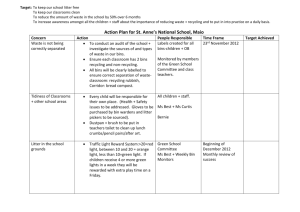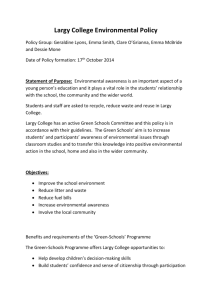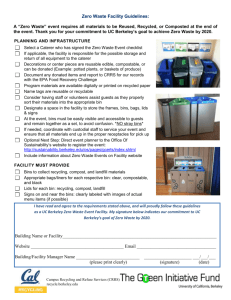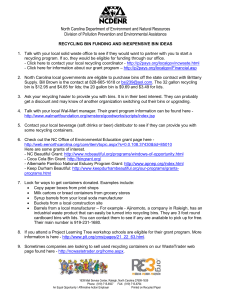Further points to consider when positioning Bin Stations
advertisement
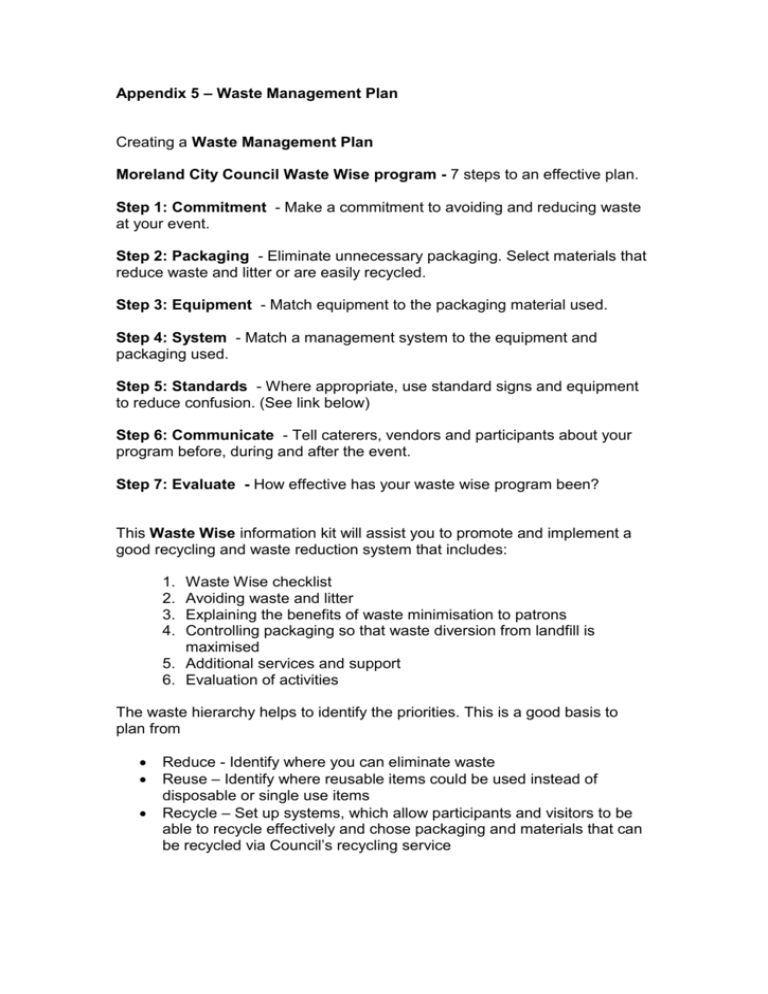
Appendix 5 – Waste Management Plan Creating a Waste Management Plan Moreland City Council Waste Wise program - 7 steps to an effective plan. Step 1: Commitment - Make a commitment to avoiding and reducing waste at your event. Step 2: Packaging - Eliminate unnecessary packaging. Select materials that reduce waste and litter or are easily recycled. Step 3: Equipment - Match equipment to the packaging material used. Step 4: System - Match a management system to the equipment and packaging used. Step 5: Standards - Where appropriate, use standard signs and equipment to reduce confusion. (See link below) Step 6: Communicate - Tell caterers, vendors and participants about your program before, during and after the event. Step 7: Evaluate - How effective has your waste wise program been? This Waste Wise information kit will assist you to promote and implement a good recycling and waste reduction system that includes: 1. 2. 3. 4. Waste Wise checklist Avoiding waste and litter Explaining the benefits of waste minimisation to patrons Controlling packaging so that waste diversion from landfill is maximised 5. Additional services and support 6. Evaluation of activities The waste hierarchy helps to identify the priorities. This is a good basis to plan from Reduce - Identify where you can eliminate waste Reuse – Identify where reusable items could be used instead of disposable or single use items Recycle – Set up systems, which allow participants and visitors to be able to recycle effectively and chose packaging and materials that can be recycled via Council’s recycling service 1. Waste Wise Checklist PLANNING Write Waste Wise Plan (incorporating bin placement sites) Set achievable goals Delegate roles and responsibilities to members of your event team Incorporate Waste Wise Plan into overall sustainability plan and event plan Action GAINING COMMITMENT - Communicate Waste Wise aims to: Council Waste Services Contractors Event Site Owners Other Service Contractors Sponsors Attendees Stallholders/Vendors Other Stakeholders Action PROMOTION Add Waste Wise message to media releases, programs, tickets, etc Issue media releases and advertising material Use all possible avenues available to promote event as being Waste Wise Obtain endorsement of a well-known identity Action DEALING WITH STALLHOLDERS AND CONTRACTORS Determine what types of materials will be used or sold, and in what quantities Have stallholders and contractors sign an agreement/contract specifying Waste Wise requirements Give clear information on materials permitted Inform stallholders and contractors of what is expected and why Consult with waste collection contractor (Council) Comply with existing Council policies Action MINIMISING PACKAGING Investigate suitability of using Wash Against Waste service to reduce disposable cups, plates, stirrers etc Specify acceptable and unacceptable materials in stallholder agreements/contracts Arrange Waste Wise supervision of stallholders during event Consult with stallholders; allow enough lead-time for them to prepare for being Waste Wise Action PLANNING BIN STATIONS Action Decide what types of bin stations are needed. Arrange back-ofhouse (behind the scenes) garbage and recycling systems Develop bin placement plan as part of overall site plan. Develop strategies for special types of waste (cigarettes, nappies, etc) Allocate roles to team 2. Waste Wise commitment – Your commitment to manage the waste generated from your event and getting the support of your partners is a key step to being Waste Wise. Gain a verbal commitment from those involved with the event through phone calls and meetings or preferably a written commitment, letting everyone know what will be happening, what systems will be in place and their part in the process. Groups involved may include: Moreland City Council Contractors and suppliers of equipment and goods Stallholders and vendors Performers and artists 3. Avoiding Waste and Litter - Understanding littering behaviour: Clean = Clean Having a better understanding of littering behaviour helps to develop more effective litter prevention programs. Research conducted by Community Change1 into littering behaviour has found that when people walk into an area they decide within the first 30 seconds how they will behave in that area. Therefore, when somebody enters an area that is already littered, they will feel more inclined to litter during their time there. However, if a person is met with a clean area they will feel uncomfortable littering there as nobody else is, therefore littering is not acceptable behaviour. To Do: Place a recycling bin at entrances, this makes visitors aware that this is an event where recycling is encouraged and expected. Ensure that there are enough bins (Council can offer advice on how many will be required based on site layout, activities and expected attendance) Place bins where rubbish accumulates (provide event site map and discuss with Council staff if unsure) Empty/replace bins when they are full. (Maintain a good presentation of the bin stations – keep area clean and tidy) 1 Community Change 2001 Measuring environmentally desirable behaviour BIEC published Littering Behaviour Study III Further points to consider when positioning Bin Stations: Use colour, signage and shape to make sure the recycling bin is distinguishable from the rubbish bin. Use of bin caps will facilitate this. Ask Council how you can obtain these when booking your bins. Place bins side-by-side, not back-to-back, to avoid confusing people who will approach the bin nearest to them. Consider the direction from which the bins are approached. Provide for safe disposal of cigarette butts within or beside the rubbish bin. 4. Explaining the benefits of waste reduction to patrons Since the introduction of the kerbside recycling collection service, resource recovery and material separation have become a normal part of daily life for Moreland residents and the wider community. Most people want to recycle as it is recognised as an easy way to reduce their carbon footprint and lessen their impact on the planet. The success of kerbside recycling means that many community members now expect to be able to recycle outside the home; at events, shopping centres and parks. The use of bin caps and recycling bins will send a positive message to your visitors and participants that you are serious about waste management. Take the opportunity to communicate your efforts by doing the following: Write a media release and issue to local media Arrange for signage (translations if necessary) Script announcements for PA or Master of Ceremonies Include waste minimisation initiatives in advertising feature of event Arrange for Council, community groups, or Metropolitan Waste Management Group stalls to promote recycling at event 5. Controlling packaging so that waste diversion from landfill is maximised Reducing waste at events not only conserves resources but also offers an opportunity to reduce running costs. Working with vendors to eliminate commonly littered items and non-recyclables can result in an event that is cleaner and therefore more enjoyable for patrons. You should aim to have a written stallholder/vendor agreement, which includes the Waste Wise requirements of the event as specified by you, the Event Organiser. The Stallholder/Vendor agrees to: Use approved materials as specified by the Event Organiser; this may include but is not limited to food and beverage containers, packaging for goods used, and materials used in producing food and other wares, (see below for a list of items that you should aim to eliminate). Use correct bins and/or waste skips for recycling and waste disposal (this will involve identifying the waste streams being collected at the event) Use only bins designated for use by stallholders/vendors (not bins designated for use by visitors) Not leave waste beside bins or in any other place that will create litter. The table below is a guide only and there may well be many other products present at your event, which could be avoided. It is up to you to consider what they might be eliminate them or offer more manageable alternatives. Many events have proven that it is possible. The key is to ensure that everyone is doing the same thing and that you communicate what is expected. Visit www.slf.org.au/eventsplanner/directory for a list of local packaging suppliers and for other useful resources and products. Present item Plastic plates Action Eliminate Plastic cutlery Eliminate Polystyrene drinking cups Eliminate Wax lined coffee cups Eliminate Stirring stick plastic Eliminate Coffee cup lids Eliminate Promotional giveaways (balloons, stickers, and other items) Plastic straws Eliminate Single serve condiments (tomato sauce etc.) Plastic carrier bags Eliminate Wax cardboard boxes Eliminate Eliminate Eliminate Option 1 Wash Against Waste service (reusable item) Wash Against Waste service (reusable item) Wash Against Waste service (reusable item) Wash Against Waste service (reusable item) Wash Against Waste service (reusable item) Use only when requested Do not allow giveaways Option 2 Paper Plates or Biodegradable alternatives Replace with natural fibres such as wood or cornstarch. Replace with natural fibre products – un-waxed paper cups, PLA cups or other materials (PLA is not suitable for hot drinks). Replace with non-waxed versions which are commonly available Wooden sticks or provide several teaspoons, which can be reused. Natural fibre products only Replace with paper straws Replace with bulk dispensers Use only when requested Encourage patrons to bring a bag Non-waxed boxes Ask vendors to supply reusable or biodegradable carrier bags 6. Additional services – Provided by Moreland Council For events where bin delivery and collection is carried out during normal working hours i.e. Monday to Friday and no additional services are required during the event, then Council will provide the delivery and collection of bins and caps for FREE. Council can provide additional services such as emptying of bins during the event and hire of the street sweeper and other waste management services to event organisers at a cost ranging from $225 for small events to $425 for large events. Additional services – Not provided by Moreland Council Since the State Government funded Waste Wise program ceased in June 2009 you are now able to access many of the tools to assist in planning and auditing your waste practices through the Sustainable Events Planner online website. www.slf.org.au/eventplanner/guide/actiontools A Wash Against Waste trailer can be hired for events at a cost of $250 for community groups and $350 for Councils. The trailer comes equipped with crockery, cutlery, urns, buckets, wash tubs, aprons and tea towels for use at events where an objective of eliminating or reducing disposables has been agreed upon by vendors. The trailer provides everything necessary for the service of food and drinks and has been successfully used at many events. The event organisers however, must provide the volunteers to do the washing up! Further information about how to book and operate the WAW trailer can be found through SLF at 9249 1888 or www.slf.org.au/waw Environmental Performers can also help to reinforce messages relating to waste minimisation and littering. Characters with a focus on litter issues and correct waste disposal behaviour can assist in providing waste education at public events in a fun, colourful and engaging manner. www.ourplanet.com.au or www.voxbandicoot.com.au 7.Evaluating your activities and providing Council with feedback On the day the waste system must be promoted to patrons through signage, activities and/or public announcements. Environmental performers can help to educate patrons about recycling and litter. At the close of the event a visual inspection of the bins is undertaken to obtain data for post promotion and continuous improvement. This information forms part of your post event evaluation report, which must be submitted to Moreland City Council. Information required is straightforward and consists of the following: Recycling Bins Number of Full Recycling bins Estimate amount of Contamination % Number of Part full Recycling bins estimate amount Full (list details for each bin) Details Estimate amount of Contamination % Waste Bins Number of Full Waste bins Estimate amount of Contamination % Number of Part full Waste bins estimate amount full (list details for each bin) Estimate amount of Contamination % Details Setting up a simple template as shown below will make gathering this information easier. Example - Waste Management Record (with organic collection stream included) Recycling % Contamination Waste % Full Waste % Contamination Organic % Full Organic % Contamination Recycling % Full Bin Station 1 – Entrance gate Set Up 9.00am Empty End of event Total Bin Station 2 – Food Area Set Up 9.00am Empty End of event Total Bin Station 3 – Children’s Area Set Up 9.00am Empty End of event Total Zero Empty Zero Empty Zero Zero Empty Zero Empty Zero Zero Empty Zero Empty Zero
